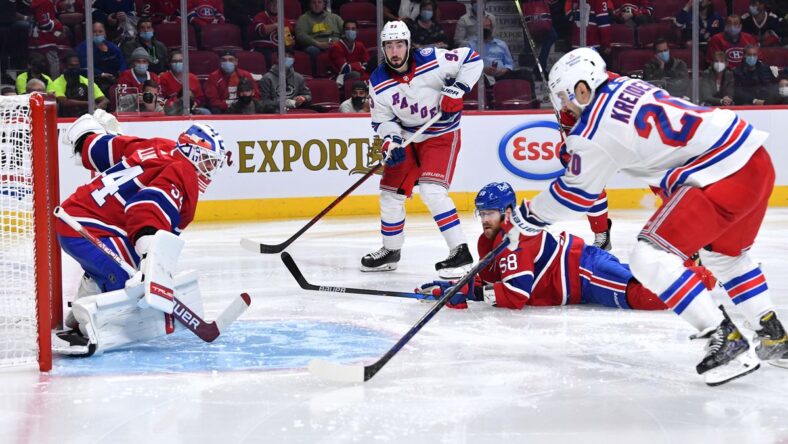
The NY Rangers star power is nearly unmatched around the league. The Rangers may not have the best scorer, or even the best forward, but they certainly have a collection of players that rank in the top-end of each position. Be it Adam Fox, Artemi Panarin, Igor Shesterkin, or one of the other top six forwards, few teams have the sheer quantity of stars the Rangers can boast. This will matter in the playoffs.
Dom Luszczyszyn of The Athletic tackled how much the Rangers star power –and star power in general– will matter in the playoffs. Hockey is a link heavy sport, unlike others, where having the best players does directly correlate to winning and success. It’s not as strong as basketball, as Dom notes, but there is a link. Sometimes, stars create their own luck just by doing their usual thing.
If you have The Athletic, the article is definitely a good read. The general conclusion is teams with more star players win, and teams with fewer bad players win. Definitely similar, but also not the same statements. More stars = more wins. Fewer bad players = more wins. More stars + fewer bad players = Stanley Cup.
Rangers star power might be under counted
Per Dom, using GSVA (Game Score Value Added), the Rangers have 7 players that are deemed “stars” –80th percentile for forwards, 75th for defensemen, top 10 goalies– this season: Igor Shesterkin, Adam Fox, Ryan Lindgren, Chris Kreider, Mika Zibanejad, Artemi Panarin, and Vincent Trocheck.
If you’re wondering where Vladimir Tarasenko and Patrick Kane are, well they don’t hit that criteria. The human factor is rarely a variable in these formulas, which leaves some risk. Nothing is perfect, after all. Defensive metrics are included, which explains the absence of Kane and Tarasenko. However that might change with better a better overall team around them.
The Rangers star power, as per Dom, leaves them tied for 6th in stars with 7 other teams. It’s highly unlikely that Kane or Tarasenko see a sharp uptick in GSVA, given it’s a season long stat. But watching how they trend will matter, and it may give the Blueshirts a star power boost come playoff time.
Since this question will come up, K’Andre Miller has a cumulative 0.5 GSVA. He’s a very good defenseman with a high ceiling, he’s just not at the star level yet. That’s fine.
Only as good as your weakest link
Generally speaking, a team is only as strong as its weakest link. For the Rangers, that means their bottom defense pair. No disrespect to Braden Schneider and Niko Mikkola, but teams will look to target them over the current top four. It’s just how the sport works. But the Rangers star power, nearly unmatched, can quickly mitigate this risk and perhaps make it a non-issue if they do what they are supposed to do.
Despite the Rangers star power, only Shesterkin is out there all game. The Rangers star power is “somewhat limited” to their top six and top pair. Teams will look to get their stars out there against weaker players.
Based solely on GSVA as of the end of February, the weakest links on the Rangers are names you’d expect.
- Niko Mikkola: -1.1 GSVA, 206th of 228 qualifying defensemen
- Jake Leschyshyn: -0.9 GSVA, 442nd of 447 qualifying forwards
- Ben Harpur: -0.4 GSVA
- Ryan Carpenter: -0.3 GSVA
Since Harpur and Carpenter are only going to be used in injury situations, the weak link per GSVA is Mikkola. It is worth noting, again, that team factors and human factors do matter and aren’t weighted, in my opinion, nearly enough in models like these. Thus, Mikkola might see a bump playing with the Rangers. Same with Kane and Tarasenko, but neither are in the negatives.
It’s the stars that get blamed
In the end, the weakest links never get blamed if a team fails to hit its goals. It’s the stars. The Rangers star power will take the brunt of it, much like Panarin taking most of the blame after last year’s loss to Tampa. Since the stars are the ones that get most of the 5v5 time and almost all of the powerplay time, this again makes sense.
If the Rangers do not win a Cup, the series loss will most likely be pinned on at least one star who didn’t produce. Niko Mikkola will not get the lion’s share of the blame.
Star power wins. Star power that doesn’t show up loses. It’s plain and simple. With most of the Rangers star power being forwards, they will likely rely on Shesterkin making big saves while waiting for their opportunities. The Rangers stars are scorers, and as long as they are scoring and Shesterkin does his thing, they will be difficult to beat. Even by Boston.
Share:
More About:State of the Rangers
